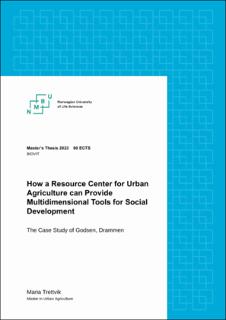| dc.description.abstract | Urban agriculture has been identified as an opportunity to provide multidimensional tools for social development in urban areas. In this thesis, social development is defined as “concepts that aims to improve and promote integral human development and wellbeing”. Former railway properties are developed in central urban areas all around Europe, and large areas formerly closed off to the public are being developed into new neighborhoods. The current threat on food security due to natural disasters, conflicts and inflation, combined with a need of securing a green and inclusive development of fast-growing cities, forms the background for the current work.
The master’s thesis explores how a resource center for urban agriculture has the potential to provide multidimensional tools for social development, particularly urban development, social inclusion, food security and governance. With an inter- and transdisciplinary approach, various methods are used throughout the thesis to study the development of the initial phases of the establishment of a resource center for urban agriculture at Godsen - the former freight terminal in Nye Nybyen in Drammen inner city. The investigations aim to identify best practices and relevant tools that provide social development at local and regional level. Identified tools aims to function as guidelines to property developers, local authorities and other stakeholders when developing new neighborhoods, during placemaking processes and when considering using urban agriculture to facilitate social development in urban development projects.
The thesis reveals a need to develop policies and secure transdisciplinary cooperation to secure the inclusion of vulnerable groups in the new neighborhood and enhance access to education, employment, land, housing, credit, quality food, infrastructure, etc. The results contribute to a broader knowledge of how tools provided by urban agriculture can contribute to a more sustainable development according to the United Nations’ Sustainable Development Goals. Further on, important institutions and organizations recommended as partners in a regional resource network for urban agriculture, are identified. Thus, the thesis provides input to how Drammen Municipality and Bane NOR Eiendom can secure social inclusion in Nye Nybyen, how Godsen can be developed to an inclusive meeting space, and how Evas Grønne Hage and Grønne Drammen can develop a regional resource center for urban agriculture in Drammen. | |
